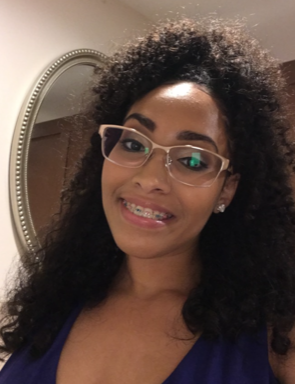First-Year MCC Student Gets By With a Little Help from Her Mentor
Saraya Torres has wanted to go to college since she was a little kid. When starting at Manchester Community College during a pandemic meant classes would be online, she didn’t love the idea but decided to go for it anyway. She planned to take four classes while working 32 hours a week at two part-time jobs.
She’s used to being self-sufficient – she is independent from her parents and lives on her own in an apartment – but when a fellow MCC student contacted her toward the end of her senior year of high school to offer to help her through the summer with the college transition process, she accepted his offer. Her mentor helped her complete the process of filling out the FAFSA and reassured her when she was waiting to hear back on her financial aid package. When she didn’t receive financial aid, her mentor put her in touch with the Financial Aid office. Unfortunately, despite three faculty members from her high school vouching for her status as fully financially independent, Torres says, she wasn’t able to attend her first semester tuition-free as she had hoped. She was only able to afford to take two classes.
Throughout the fall semester, her mentor, Stefan Hall, continued to text her to check in, asking about how her classes were going and how she was doing. When she told Hall she was struggling with her online math course, he told her about the academic support center and gave her a link to the center’s website so she could request a tutor. Torres didn’t have a working printer, something she needed for a class, and Hall told her who to reach out to at the college to access a printer. He also sent her the department co-chairs’ emails should she want to appeal the professor’s requirement; and, he offered to advocate for her so she wouldn’t be forced to print material or suffer academically, but she declined those offers.
Not having a printer or internet are just the kinds of obstacles that cause students to fall behind and drop out, says T.J. Barber, director for outreach and student life at MCC. Because of budget cuts, MCC’s academic advisors have a caseload of 700 students each, he says. He’s grateful for the Achieve Hartford mentors who serve as resources to first-year students, the large percentage of whom are first-generation and low-income students who don’t have anyone in their life to guide them through getting into and through college.
“We really try to make it possible for students to be paying attention to what’s happening in the classroom. If you’re sleeping on a bench in Bushnell Park, solving for X is the least of your problems,” says Barber. “Having a partner like Achieve Hartford makes all the difference. We know a significant number of students would not be on our campus if not for Achieve Hartford mentors helping them.”
As the fall semester progressed, Torres’ mentor reminder her when it was time to fill out the FAFSA and register for spring classes. She appreciates both the information and the support she receives from Hall, she says, especially going to school during a pandemic.
“Just hearing from someone checking in to make sure I’m OK really helps. Stefan emailed me saying, ‘Your mental health is important too.’ He kept giving me information that he thought that I may need to help me along the way. He’s been very open about that stuff,” she says. “He says, ‘I’m not the person who knows everything. I know some stuff.’ He told me he doesn’t like having to take courses all online. That put me at ease; I’m not the only person struggling with the material. He’s ahead of me [in college.] He has more experience than I do. It’s good to know there are people who are the same age as I am who are here to help new college students.”
“Peer mentorship is at the heart of Achieve Hartford’s summer transition and college persistence programs because it works,” says Paul Diego Holzer, executive director of Achieve Hartford. “Let us know if you want more information on college-level peer mentorship.”

